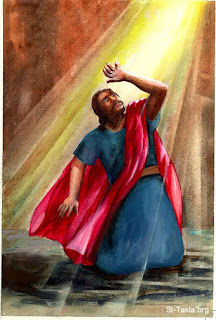Readings: Acts 22:3-16; Ps 117; Mk 16:15-18
The call to conversion by Jesus can
come at the most inopportune times. Recall how Peter and Andrew, James and John were
working hard at their profession as fishermen when Jesus showed up and called
them away.
“Follow me and I’ll make you fishers of men” [Mk 1:17].
They probably didn’t have a clue about
what this would mean for them, but they followed, nonetheless.
Then there was Matthew, the
tax-collector. He had a sweet deal going, collecting taxes for the Romans, and
pocketing plenty of cash for himself. But Jesus comes along and simply
says, “Follow me!”, and Matthew drops everything [Mk 2:14].
Imagine what their friends and
relatives thought. You’re doing what? With whom? And you’re leaving everything
behind…your business, your family, everything?
Called by Jesus these practical, down-to-earth men willingly gave up everything for something
they did not yet understand. Yes, Jesus wasn’t just some itinerant
preacher. Obviously, there was something very different about Him, something
beyond normal human experience.
Imagine, too, what the future
apostles thought when John the Baptist pointed out Jesus to them: "Behold! The Lamb of God!" [Jn 1:29] Behold the
sacrificial lamb, the one who will give His life for the world. Jesus was
something more than special. He was, as Peter would later profess, “The Christ, the Son of the Living God!” [Mt 16:16]
But not everyone agreed. One was a
young Jew named Saul. He was a Pharisee, a Jew of the tribe of Benjamin, a
native of the cosmopolitan city of Tarsus in the region of Celicia in Asia
Minor. As Paul later described it, Tarsus was “no mean city” [Acts
21:39].
Yes, indeed, Saul was no peasant. Paul’s family was apparently distinguished enough that the emperor had made
them Roman citizens, a rare honor. And for his fellow Jews, he had the prestige of
being schooled by the famous and learned Gamaliel.
As a Pharisee, now in Jerusalem,
Saul had no patience for the new and dangerous sect that worshiped this Jesus
of Nazareth as Messiah and Son of God. What a blasphemy! This Jesus could be
only a false Messiah, for He had been crucified as a criminal, and had preached
such foolishness as the brotherhood of Jew and Gentile.
Certain of himself and his mission, arrest warrants in hand, Saul was on his way to Damascus, 135 miles distant, to root out the followers of this Jesus and bring them back in chains for prosecution. But it is here, along this road to Damascus, that Jesus calls him.
Knocked to the ground, blinded, overwhelmed by the voice of God, Saul is accused of persecuting Jesus Himself. But Jesus has plans for Saul. Renamed Paul, he is in God’s own words, “His chosen instrument.” This zealous Jew will now carry Jesus, the living and incarnate Word of God, to the world, to both Jew and Gentile.
Paul’s calling might have
been exceptional in manner, but it was really no different from the calling of
every Christian. For, just like Paul, we are all called to follow Jesus in
holiness, to enter into an ongoing conversion; and like Paul it is our response
that makes the difference. We are all called to the apostolate, to be apostles
of Jesus Christ, to be the ones who are sent.
God’s voice comes to us
all, that inner voice that brings both a calm acceptance and a restlessness to
obey. It speaks to us in the words of the prophet, revealing all that God wants
of us, dispelling uncertainty and fear, calling us to respond with our entire
being.
Can we abandon ourselves,
our autonomy? Can we accept that we too are called, we too are chosen to do, to
give, to speak, to pass on to others all that He has given us, done for us? Can
we make this our prayer? “What would you have me do, Lord? Tell me and I will
do it.”
As Pope Paul VI preached:
“…it becomes a need to hasten, to work, to do everything one can to spread
the Kingdom of God, to save other souls, to save all souls."
Of course, God gives us a
choice. But how did St. Paul put it?
“Christ Jesus has made me his own” [Phil 3:12].
That’s right, like Paul we belong
to Jesus Christ now. To turn away from that would be foolishness indeed.



